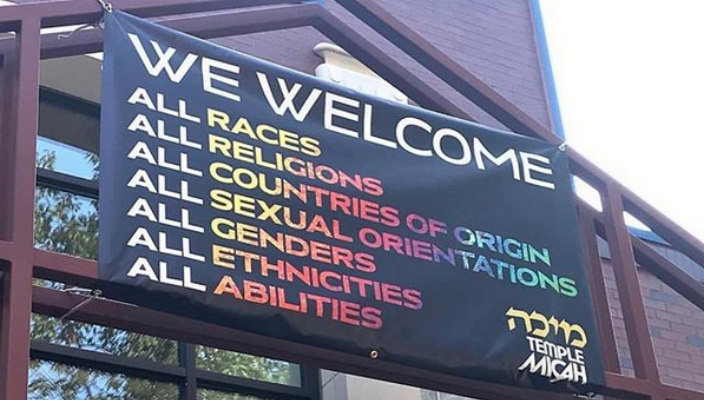
If you want your congregation to be strong and to thrive, audacious hospitality is not optional. Creating inclusive spaces and taking proactive measures to respect your members on the margins isn’t a nicety, like installing a coffee machine in the foyer. It’s a necessity.
Think of it this way: Audacious hospitality is as necessary to your congregation as your Torah scroll.
Consider these statistics: A fifth of the Jewish population is racially and ethnically diverse and more than 70% of non-Orthodox Jews who married after 2000 were in interfaith marriages.
We live in times of change and increased social awareness. Additionally, people are seeking experiences that relate to all aspects of their identities. If your institution is not doing everything possible to foster a safe, welcoming, and equitable space for all members and visitors, they’ll find another community that will.
It can be difficult – but, ultimately, healing – to implement genuine acts of audacious hospitality. If, however, you’re willing to invest in that effort, your congregation will become a place of true wholeness, compassion, and justice, and your actions will help transform today’s Jewish landscape.
If you’re not sure where to start to take audacious hospitality to the next level, consider these four high-impact areas of focus for your congregation:
1. Your Congregation’s Governance
Twentieth-century models of congregational governance no longer work. To meet the needs of our changing Jewish landscape, diversity and inclusion must be prioritized within the governance of the congregation.
Make sure you have clear foundational statements that establish inclusivity, likely in a values statement. It’s important to ask: Do your existing statements include language that is outdated or unintentionally exclusionary? If not, do they truly and properly articulate the inclusive community you envision?
Look, too, at who leads your congregation. New leaders with different talents and backgrounds will bring new ideas to your congregation. Empower a diverse group of people – with regard to race, sexual orientation, gender, age, socio-economical background, and people with disabilities, as well as other factors – to assume leadership roles.
2. The Design of Your Programming
To maintain an interesting and active congregation, your programming should reflect the diversity and interests of all your members. Your programs and the interactions you have with congregants will be more robust and enriching if they address the evolving 21st-century Jewish demographics and the diverse experiences of your members.
The principle “Nothing about us without us,” or bringing congregants into the design process, is critical to creating programming for diverse groups. Co-construct your offerings with a broad range of members, and if you need additional resources, invite outside speakers to address your congregation.
For example, ask a Jew-of-Color to speak about the effects of systemic racism within the Jewish community, or invite an LGBTQIA+ Jewish leader to guide your leaders regarding use of pronouns and all-gender washrooms. If you’re holding Introduction to Judaism courses, encourage Jews-by-choice to speak and potentially lead classes, especially if they identify as Jews on the margins. Provide a platform for interfaith families to speak about differences and similarities among their extended families’ belief systems.
3. Your Online Presence
Assume that prospective members will research you online. You have approximately 10 seconds to communicate your value proposition to online users through your website or social media sites. Take a look at your congregation’s website, paying special attention to your home page and your “About Us,” “Mission,” and “Values” sections. Are they authentic, compelling, and specific? Or do they include vague proclamations that your synagogue is “warm and welcoming,” without any evidence to back up the claims?
When designing and editing your site, list ways your congregation works to be a warm, vibrant community. Post photos reflecting the diversity of your congregation; discuss what you’re doing for your congregants and within the community at large; communicate your congregational values clearly and effectively so that visitors and prospective members know they will be walking into a space that welcomes them for who they – and their families – are.
Need some guidance? Use our “Welcoming Website Checklist” in the URJ’s Audacious Hospitality Toolkit to get started.
4. Your Partnerships
A strong congregation cannot thrive without rooting itself firmly within the community it serves. You can do this by reaching beyond your existing membership and establishing connections with other local synagogues, organizations, and houses of worship.
By being in relationship with other Jewish allies, you allow your members to foster meaningful connections and make an impact on the larger Jewish community. Partnering with both local interfaith and secular organizations is important, too, because it showcases an authentic desire for allyship that crosses lines of creed and culture, and it reinforces our tradition’s teaching of b’tzelem Elohim, that we are all created in the image of the Divine regardless of our beliefs.
Making transformative change to the inclusive practices in our Jewish community starts at home. This work isn’t always easy and mistakes will inevitably happen in the pursuit of a better future. Recognizing areas for improvement in your community – particularly through actively listening, apologizing, and adapting a willingness to change – will foster deep trust among you, your congregants, and your sacred partners.
Although this work can be challenging, and you must be willing to change and be open to making mistakes along the way, it’s all worth the effort – because every one of your members is worth it. If you’re serious about creating a community that is relevant in the 21st century, making your congregation audaciously hospitable in both small- and large-scale ways is essential.
The time to act is now.
For more information about how to make your congregation inclusive, download the URJ’s Audacious Hospitality Toolkit and Educational Resource Modules. For more information about 21st-century governance practices, search for #GovernanceBestPrinciples in The Tent.
Have something to say about this post? Join the conversation in The Tent, the social network for congregational leaders of the Reform Movement. You can also tweet us or tell us how you feel on Facebook.
Related Posts

Teen Jews of Color Fellowship Empowers Young Leaders

Celebrating the Pioneers of URJ 6 Points Sports Academy: A Hall of Fame Induction


